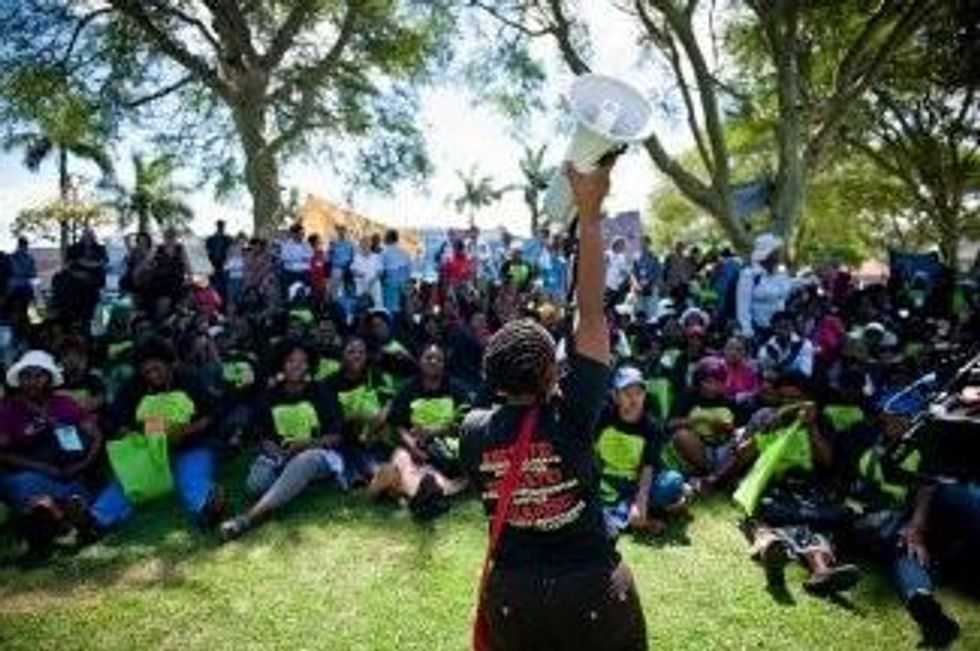This has been a year of unprecedented weather-related disasters, at home and around the world. The world's leading climate scientists have proclaimed these disasters related to climate change, and have told us to expect more severe, frequent extreme weather events.
Who bears the brunt of the increasingly steep costs of "global weirding" as the world's weather goes haywire? Women and their children. And who may be the key to stopping global warming, and to helping communities around the world adapt to the damage that has already been done? Yes, women too.
The Intergovernmental Panel on Climate Change's special report on extreme weather hit the headlines just before international climate negotiations began again in Durban, South Africa this week. However, experts have known for some time now that women pay a heavy price in our changing climate.
One UN study estimates that women are four times as likely as men to lose their lives in a natural disaster, and far more likely to suffer ill-health as well. The reasons are sometimes obvious, and sometimes less so. Women are often more susceptible than men to inadequate nutrition, for example, which can be exacerbated by weather and climate changes. Women and girls face a steeply increasing threat of violence and injury as they walk further and further every day to collect water and fuel. Many have limited access to healthcare, due to lower incomes and, in many cases, restrictive cultural practices. This problem is compounded as a changing climate allows new diseases to take hold, and old ones to reemerge.
Seventy percent of the world's poor are women, and poor people are most in the line of fire of climate change, though they have done the least to cause it. Researchers estimate that the poorest people in the world, who contribute the least to carbon emissions, will suffer the most from the effects of rising temperatures - up to 500 times the loss of life compared to those in developed countries.
Yet women are also extraordinarily under-represented in the very forums designed to address climate change. At the last international climate conference women accounted for just 30 person of all delegation members, and less than 15 percent of all heads of delegations.
At the same time, however, women around the world hold valuable knowledge and skills that can make them powerful forces for positive change. Advancing women's empowerment and health are the right thing to do for the attainment of universal human rights and equity. But these same strategies also foster sustainable development. Chief among these are investments in women's and girls' health and education, which build women's resilience, leadership, capacity for economic innovation and autonomy.
Investments in reproductive healthcare, assisting women in avoiding, spacing, or limiting pregnancies, are crucial to lowering high rates of unintended pregnancy, and of maternal and infant mortality. When women are able to plan their pregnancies, they can exercise their fundamental human rights and decide what they as individuals want to achieve educationally, economically, and socially. These gains improve their own livelihoods and that of their families, and increase their ability to access food and health services for themselves and their children.
Women are among those most affected by climate change, but they are also able to bring forward innovative solutions - starting with the family, through the community and up to the national and international negotiating tables. Empowering women is first and foremost a matter of health, equity and justice, but it is also a key pathway to achieving healthy, resilient and sustainable communities and societies.
Numerous statistics and studies support the paramount importance of investing in women's and community health as part and parcel of any climate change plan. However, the real power of this argument is in the on-the-ground experience of changing a community by investing in the ideas and initiatives of women themselves. It is these entrepreneurs who change things one person, one family, one village and one state at a time until that change is as endemic as poor health and malnutrition are today.
It is not only economically and politically smart to make these targeted investments, it's the right thing to do. These days, the moral imperative may get short shrift. But as leaders gather in Durban this week, we believe it's time for them to get serious about tackling the human impacts of an increasingly volatile climate.



